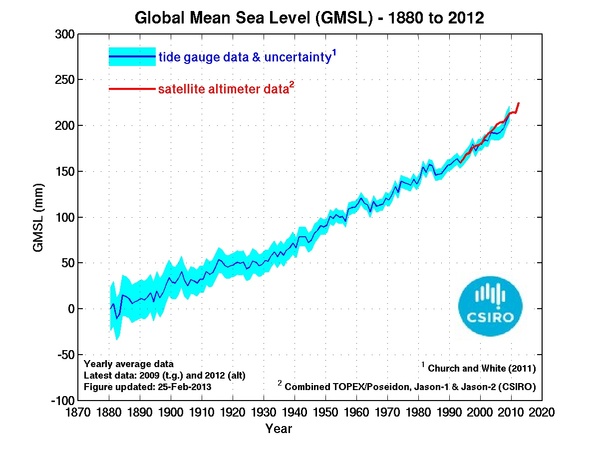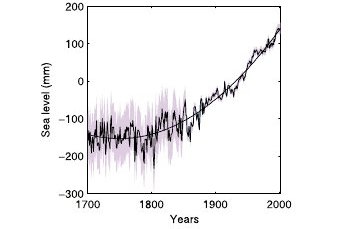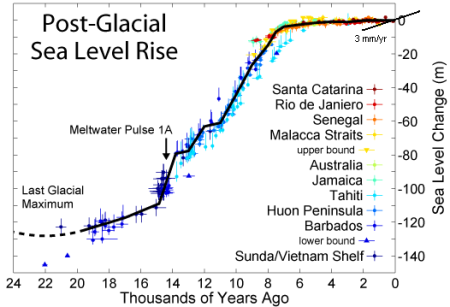Monckton Myth #8: Rising sea levels
Posted on 27 January 2011 by Rob Painting
 Regular readers will know the drill by now, this is one of a series of posts responding to a number of claims recently put forth by British climate skeptic Chris Monckton, in response to an article in the Australian by Mike Steketee. So let's begin.
Regular readers will know the drill by now, this is one of a series of posts responding to a number of claims recently put forth by British climate skeptic Chris Monckton, in response to an article in the Australian by Mike Steketee. So let's begin.
SEA LEVEL & SATELLITE ALTIMETRY
Monckton - "In fact, the rate of increase in sea level has not changed since satellites first began measuring it reliably in 1993"
Chris Monckton is correct that the rate of sea level rise has not accelerated throughout the 17 year period of satellite altimetry, however it is still rising in a linear fashion at around 3mm per year. His suggestion that the tide gauge data is not reliable isn't borne out by simple fact checking however, the tide guages are still in use and their data overlap the period of satellite observation. Both satellites and tide guages are in broad general agreement.

Figure 1. - Global mean sea level since 1870. Courtesy of CMAR CSIRO
SEA LEVEL ACCELERATION
Monckton - "It (satellite altimetry data) is a dizzying 1 ft/century – not vastly greater than the 8 inches/century that had previously been inferred from tide-gauges."
The insinuation here is that the rate of sea level rise has not changed appreciably over the timespan of record keeping. This is not correct. Church & White 2006 found that the rate of sea level rise accelerated throughout the 20th century. Merrifield 2009 also found a 20th century acceleration and another study (Jevrejeva 2008) show that the acceleration began as far back as the 18th century.

Figure 2. Sea level reconstruction since 1700 from Jevrejeva 2008. Shadow represents the errors of the reconstruction & fitted curve is a second order polynomial fit.
CORAL CAN'T SAVE THEMSELVES LET ALONE PACIFIC ISLANDERS
Monckton - "A recent paper has confirmed what marine biologists had long suspected: coral atolls simply grow to meet the light as the sea rises, and some of them have even gained land mass recently according to a just-published scientific paper."
This reference is to Webb & Kench 2010, in which the authors examined aerial photos and satellite images of 27 coral atoll islands in the South Pacific taken decades apart. Despite rising sea level rates in the region of 2 mm per year, only 14% of islands decreased in land area. Measurements of height changes were not made.
How this negates current concern about sea level is rather a mystery; sea level rates until now have been relatively small but are expected to increase as global temperatures rise and ice melt accelerates. Rates projected for this century range from 8 - 18mm per year (Grinstead 2008, Vermeer & Rahmstorf 2009) and coral reefs are actually in very poor shape, particularly from warm-water induced mass coral bleaching and ocean acidification. Globally coral are in decline, with about 40% of coral cover being lost in the last 3-4 decades, and recent studies have shown that coral growth rates on the Great Barrier Reef, Australia (De'ath 2009), South East Asia (Tanzil 2009) and the Caribbean (Bak 2009) have dropped in the last couple of decades. That coral can cope with the with the projected rate of sea level rise when they are in crisis (Veron 2009) and at elevated risk of extinction (Carpenter 2008) is somewhat far-fetched.
MORNER - THE "WATER" EXPERT
Monckton - "Professor Niklas Mörner, who has been studying sea level for a third of a century, says it is physically impossible for sea level to rise at much above its present rate, and he expects 4-8 inches of sea level rise this century, if anything rather below the rate of increase in the last century."
Mörner is a retired professor from the University of Stockholm. who has recently criticized current scientific work on sea level. Work by Vermeer and Rahmstorf contradict Mörners' claim. Examining sea level and it's relationship with global temperature, they develop a method for estimating sea level which accurately simulates observed sea level rise. When this method is applied to warming anticipated this century, an acceleration of sea level is projected.

Figure 3. - From Verrmer & Rahmstorf 2009. Sea-level rise from 1990 to 2100, based on IPCC temperature projections for three different emission scenarios
SEA LEVEL ACCELERATION - HISTORY REPEATS?
Monckton - "In the 11,400 years since the end of the last Ice Age, sea level has risen at an average of 4 feet/century, though it is now rising much more slowly because very nearly all of the land-based ice that is at low enough latitudes and altitudes to melt has long since gone."
The Greenland and Antarctic ice sheets have more than enough ice to cause a jump in sea level rates. The question is how quickly that ice might melt. We can look at the last interglacial, the Eemian for insight, because Earth's land, plants, ice and circulation were similar to today.
At the height of the last interglacial (about 115,000 -130,000 years ago), global temperatures were 1-2 degrees C warmer than now, resulting in less global ice than today at its peak because of different Earth orbital cycles. Sea level rises at times during this period exceeded 36mm per year (Blanchon 2009 ) . Kopp 2009 estimate that global sea levels rose 6 to 9 meters higher than now, and the authors commented:
"The results from the LIG (Last Interglacial) suggest that, given a sufficient forcing, the present ice sheets could sustain a rate of GSL (global sea level) rise of about 56–92 cm (5.6-9.2 mm per year) per century for several centuries, with these rates potentially spiking to higher values for shorter periods."
Rising sea levels are a legitimate concern based on the best scientific evidence available; idle speculation by Chris Monckton is not a reasonable basis to suggest otherwise.































 Arguments
Arguments























 0
0  0
0







Comments